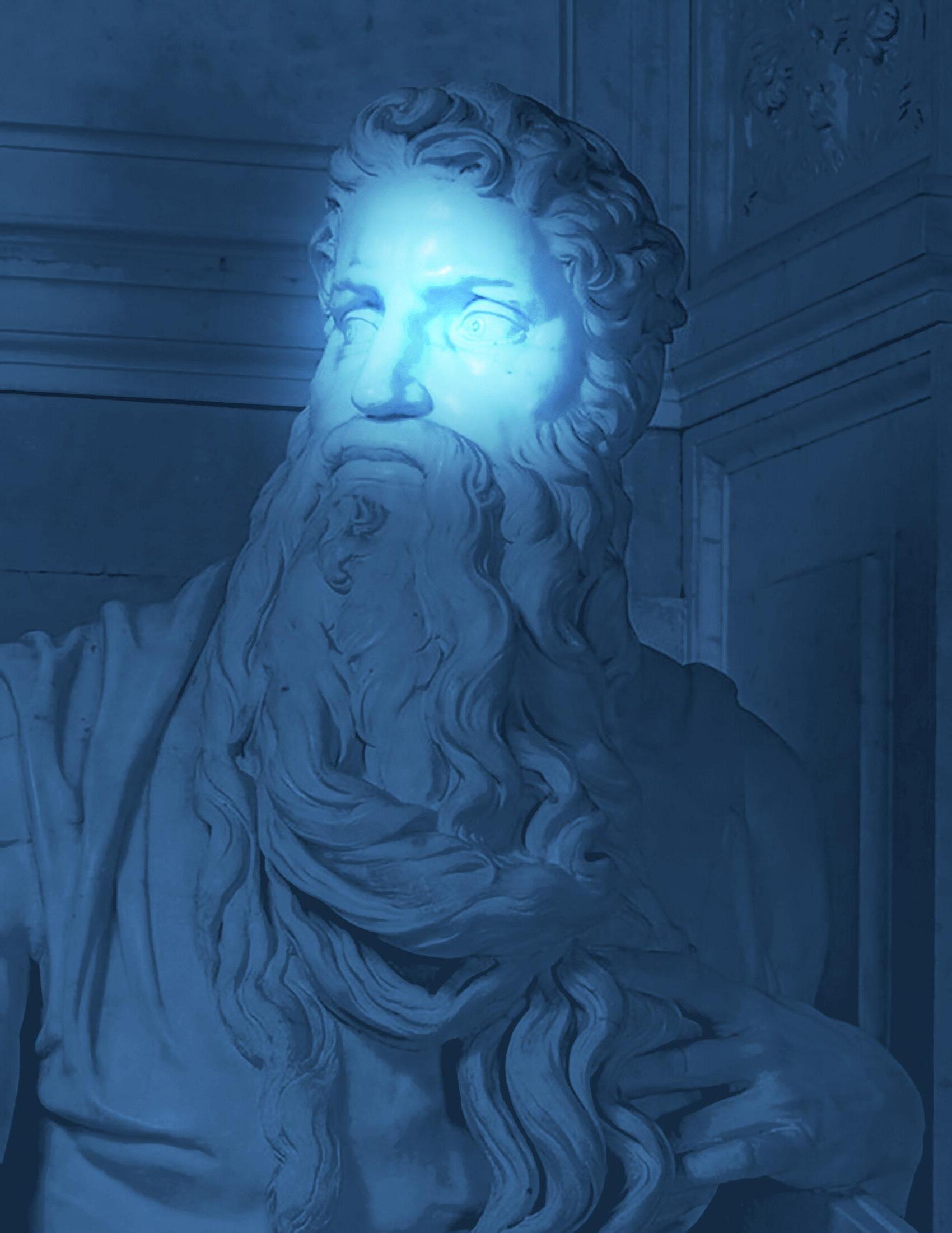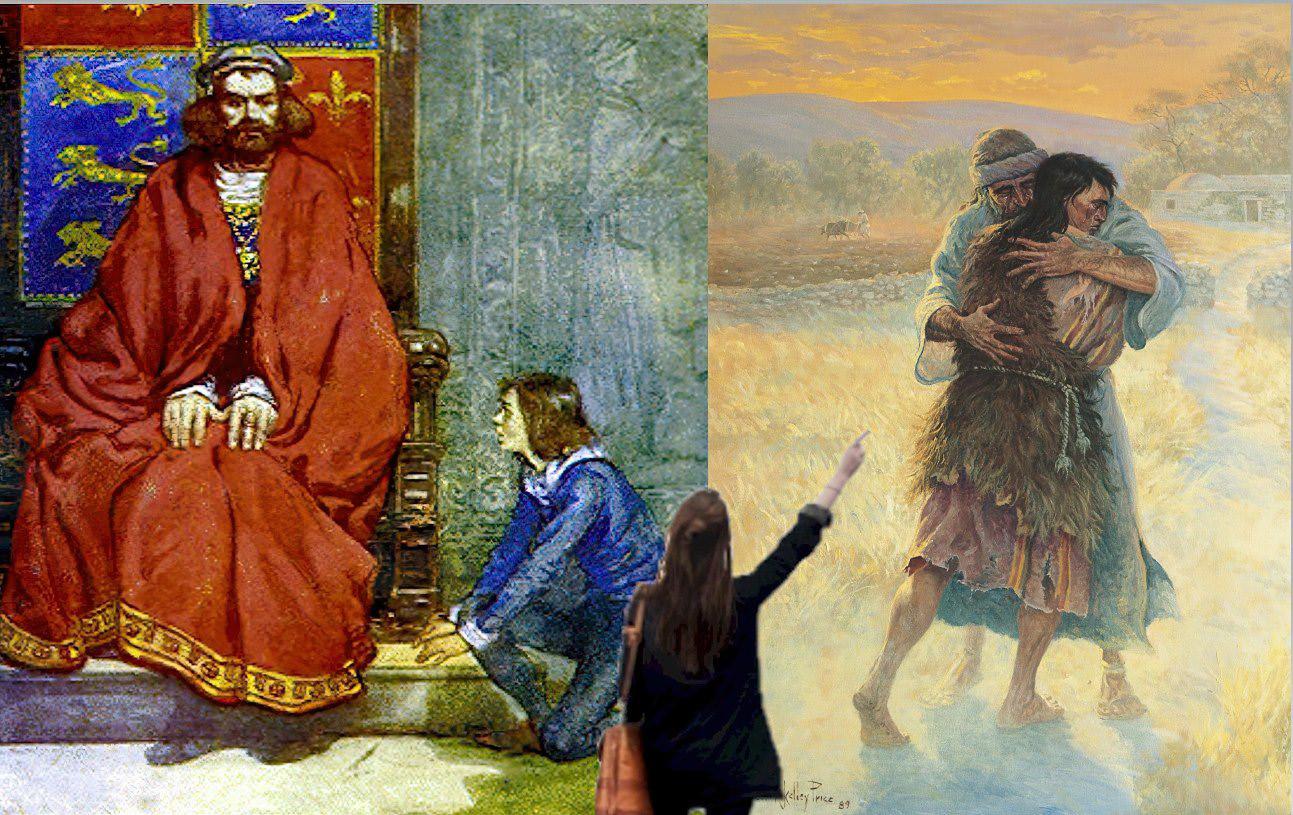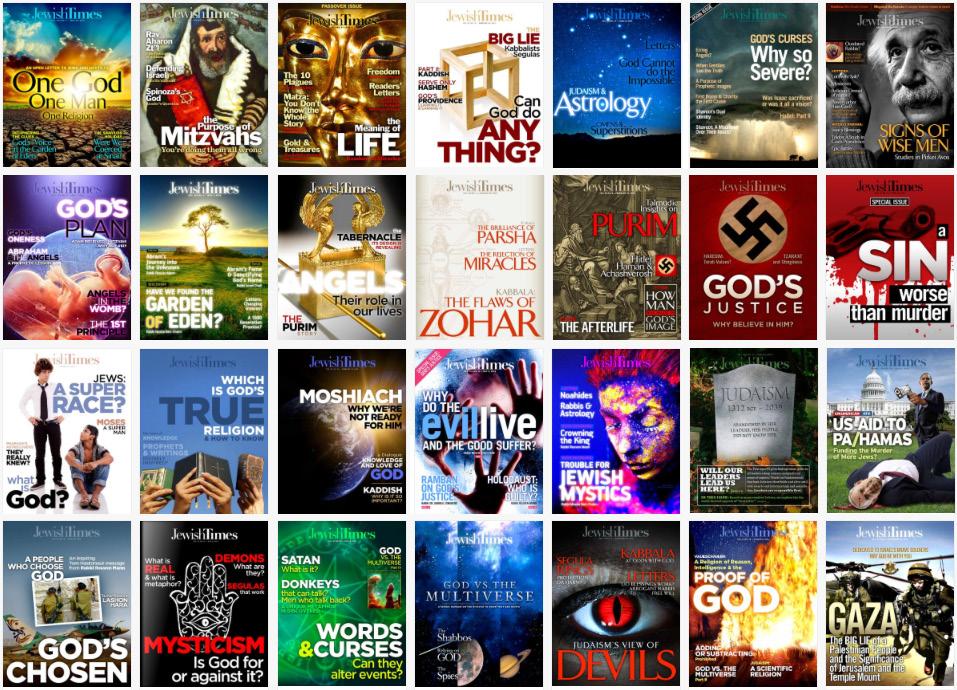


























| Please send letters and questions to: Comment@Mesora.org |
LETTERS How God designed us to attain happiness
5 Patriarchs
RABBI MORTON MOSKOWITZ Patriarchs form a vital lesson regarding Torah
RABBI MOSHE BEN-CHAIM What lifestyle do God’s holy ones lead?
RABBI MOSHE BEN-CHAIM Moses’ face beaming light preserves Torah
RABBI REUVEN MANN Aaron’s peaceful perfection
RABBI MOSHE BEN-CHAIM 2 sins of severe corruption
RABBI MOSHE BEN-CHAIM Honoring Parents: How it perfects us

To suggest the universe always existed, means it never had a creation, and thus, it could not have come into being, for all physicality cannot create itself. Secondly, had the universe always existed, the present would be long gone. Yet, it is here.

READER: I recall reading on Mesora.org an essay quoting Rabbi Chait: “One cannot find fulfillment in the physical.” How does that square with the Gemara that Hashem made everyone's craft appear beautiful in his eyes? Are you going to say that the feeling stems from the yetzer harah? —Alex Kahgan

RABBI: Rabbi Chait means that fulfillment—“true happiness”—cannot be found in the physical world alone. While we require and enjoy food and sexual gratification, these alone do not address man's non-physical element—his soul—which is the source of true happiness. If the soul/mind is disengaged, no other pursuit will compensate to provide happiness. We simply are not designed to be happy from purely physical pursuits, as this ignores our intellect which requires activity for man to find satisfaction throughout life. Conversely, even a poor Torah scholar finds the deepest happiness in his studies. Certainly a Torah scholar who is not poor will have less stress, but the poor and rich man both find the greatest enjoyment in wisdom. This addresses why pure physical existence does not provide fulfillment.
But this speaks nothing about enjoying one’s trade. The saying above indicates that in God’s kindness, He designed man with varying personality types. Based on his personality, man seeks a livelihood and pursuits complying with his nature. Since a certain man selected one trade over another, this indicates his preference of activity, which naturally complies with his psychological make up, and this compliance produces an easier and happier existence. That's what it means that

eyes”: the trade he chose is due to his personality leanings, and is what he favors. And yes, this preference stems from man’s instinctual element. We must not belittle our instincts since they are God’s creations. And when used properly like any other creation, they contribute to man's well-being.
Physical pursuits alone do not provide happiness. But as man needs to provide for himself, God was kind in creating man where he selects a trade that complies with his unique personality. Labor alone will not provide happiness, but as it is needed, God was kind to man by creating him with a sense of satisfaction in activities he prefers. Man's selection and satisfaction are both instinctual and are a good when combined with a Torah lifestyle: “Rabban Gamaliel the son of Rabbi Judah Hanasi said: ‘Excellent is the study of the Torah when combined with a worldly occupation, for toil in them both keeps sin out of one’s mind’” (Avos 2:2).
A second kindness is that as God creates people with varying interests, this sustains the world. For if every man preferred silversmithing, and there were no farmers, shepherds, carpenters, shoemakers, or weavers…man would perish as there would be no crops, homes, or clothing. God's plan of man being diversified in his preferences sustains the world. ■



If the purpose of the commands is just to keep Torah, what di erence is it if we are Israelites, or another nation? Why must Torah observers be descendants of the 12 tribes? Why can’t Torah observers be any people who keep Torah? We also must ask what or who are the patriarchs?
The patriarchs and matriarchs did not have Revelation at Sinai and therefore they did not keep the commandments (mitzvos). They perfected their souls by coming in line with God’s will without commandments. They had that ability to relate to God directly through their minds. Most people cannot do this and require a system (Torah) to attain perfection. Torah’s purpose is not merely commandments, but to help mankind attain the level of the patriarchs. Thus, Israel’s mission must always be attached to the patriarchs to show that the life of the patriarchs embodies the essence of the commands. If we lose the attachment to the patriarchs, that would separate the patriarchs from the commandments, and people will just
keep the commandments as an end themselves, without using them as a means of attaining the perfection of the patriarchs.
The Torah system includes the patriarchs to impress this idea that perfection is not only the commandments, as the patriarchs had no commandments or halacha. Now, if halacha was the essence, the patriarchs didn’t have the essence! Our nation must always connect to the patriarchs to represent that idea. The patriarchs surpassed our perfection, probably greater than you could ever reach, and they did so without halacha.
Gentiles are prohibited to observe laws outside of civil laws, due to our mission. If gentiles kept the Torah, it would confuse the world to believe that all that is required, is keeping the commandments. But this would forfeit the Jews’ mission, that the essence is perfection of the soul, embodied in the patriarchs. As gentiles are not connected to the patriarchs, only the descendants of the patriarchs can teach this lesson. [Therefore those who represent Torah’s objective—the perfection of the patriarchs—they alone most observe the commandments to teach that the commandments isolated from the patriarchs is not God’s will, and is not human perfection]. ■






Not only the tribe of Levi, but any of Earth’s inhabitants whose spirit generously motivates him, and he understands with his wisdom to separate and stand before God, to minister to Him and worship Him, to know God, living justly as God made him, and he removes from his neck the yoke of the many calculations which people seek, he is sanctified as holy of holies. God will be His portion and heritage forever and will provide what is su cient for him in this world like He provides for the priests and the Levites. And thus David declared [Psalms 16:5]: “God is the lot of my portion; You are my cup, You support my lot.” (Maimonides, Laws of Shmitta and the Jubilee 13:13)
Any person—Jew or gentile—can earn this providence. This describes God’s optimal life for man: to be fully engaged in studying God’s wisdom. But it is di cult to abandon a practical life, a financially planned life, and instead, trust God’s unknowable methods of support. Man veers far from taking chances forfeiting success, making “many calculations” to secure success. But then there are men like King David who can’t abandon Torah, regardless of financial insecurity. They prefer to remain engaged in Torah study, to the point where they might subsist on only bread and water, and sleep on the ground (should it come to that) and trust in God: “God is the lot of my portion; You are my cup, You support my lot” (Psalms 16:5):

Such is the way [of a life] of Torah: you shall eat bread with salt, and rationed water shall you drink; you shall sleep on the ground, your life will be one of privation, and in Torah shall you labor. If you do this, “Happy shall you be and it shall be good for you” (Psalms 128:2): “Happy shall you be” in this world, “and it shall be good for you” in the world to come. (Avos 6:4)
Such people find the only worthwhile life not in physical security, but in exploring God’s wisdom at all moments and at all costs. And the rabbis teach that in fact, God cares for His holy ones:
Rabbi Nechunia ben Hakkanah said, “Whomever takes upon himself the yoke of the Torah, there is removed from him the yoke of government and the yoke of worldly concerns” (Avos 3:5).
Rabbi Jonathan said, “Whomever fulfills the Torah out of a state of poverty, his end will be to fulfill it out of a state of wealth” (Avos 4:9).
This security God provides is fully sensible, as God's preference is that man “minimizes his work, and maximize his learning” (Avos 4:10). God will certainly help one attain this lifestyle.
But now let’s analyze our first source in detail and identify such a person’s perfected character traits. Maimonides says, “his spirit generously motivates him.” Spirit (ru’ach) refers to man’s ego (Ibn Ezra, Koheles 7:3). Maimonides teaches that man must first be able to abandon the need for peer approval. By recognizing no value to his soul or to his perfection in striving for wealth, he abandons the ego satisfaction of societal success and their applause, and therefore he can release himself from following society. He can do this as “he understands with his wisdom.” That is, knowledge—not emotion—guides him. He realizes that in his temporary life, he should benefit his “true self”—his soul. That is the essence of man, not the temporary physical wealth and status.
Next: “He separates and stands before God.” Unconcerned with societal status, he separates from society. He chooses to be before God, not before man. “Standing before God” means he engages in God’s wisdom all day. His mind is curious about God’s creation and His Torah. Worldly matters are distractions from what his soul enjoys most.
Next: “to minister to Him and worship Him.” By comparison to the previous halacha 13:12, which discusses the Levites ministering to God—“To minister unto Him and to instruct people”—we can understand ministering to God
as spreading His Torah. The personality we discuss follows the Levites’ act of teaching Torah, for all Temple practices embodied wisdom. And he also worships God, which means subjugation to God: “He performs God's will as his own will” (Avos 2:4). The self is lost as his focus is God’s will and wisdom alone, “to know God.”
“Living justly as God made him” describes a person who is fair and kind to others. Here again his own ego plays no role to take advantage of others. Just the opposite: he views others as God’s will and treats all people with complete care, equality, justice, charity and kindness.
“He removes from his neck the yoke of the many calculations which people seek”
Targum on Koheles 7:29 writes as follows:
God made Adam the First upright before Him and just; and the serpent and Eve seduced him to eat of the fruit of the tree, because those who eat its fruit would be wise to discern between good and evil, and they brought upon him and all the inhabitants of the earth the day of death; [then] they sought to find many calculations in order to bring deficiency upon the inhabitants of the Earth.
Targum teaches that it was only after sentencing mankind to death, that Adam sought these many calculations. These calculations refer to man's obsession with many physical preoccupations to regain a sense of immortality. Through physical possessions and pleasures—earthly matters—Adam sought to deny his death sentence…and mankind followed suit. But the holy man we discuss accepts a temporary Earthly life, knowing that wisdom is eternal, and the only value. He reaches the highest level human: “he is sanctified as holy of holies.”
“God will be His portion and heritage forever” He earns eternity.
“And God will provide what is su cient for him in this world like He provides for the priests and the Levites.” Special providence exists for holy people. ■
Rambam is not describing a person who learns a day or two, or learns even a few hours every single day. But he describes one who transforms his whole day-to-day life to abandon society due to his self-realization of Torah's astonishing value. He cannot avoid Torah study. It's not a person who learns to receive God's monetary support. But one who learns because nothing else compares. Rich or poor, his life is blissful.

And [God] said, “Do not come closer! Remove your sandals from your feet, for the place on which you stand is holy ground!” And he said, “I am the God of your fathers: the God of Abraham, the God of Isaac, and the God of Jacob.” And Moses hid his face, for he was afraid to look at God.(Exod. 3:5,6).
Chizkuni writes,
The fact that Moses hid his face at this point was the reason that he merited that he eventually attained a spiritual level when his own face radiated spirituality to the degree that unless he was discussing Torah, the people could not bear looking at him (Exodus 34,30).
At Sinai, the people readily accepted the 10 Commandments as divine, as they witnessed the miracle of the voice emanating from fire. But how would they know that all future teachings Moses shared were not his own? Therefore, God made the miracle of Moses’ face shining light all his years, to endorse all Moses’ future teachings as divine in origin. Moses did not originate any teachings and then claim they came from God. For had he done so, God would not endorse such a liar with the miracle (his face shining).
Now, what was the connection between Moses hiding his face and his face shining? Although his face shining had its own purpose, Chizkuni wishes to teach another lesson. Why did Moses hide his face? Certainly, he was not in any danger, and certainly there's nothing to be seen regarding our metaphysical God.
Moses hiding his face demonstrated Moses’ care in not trying to understand more than he could. His humility restrained his mind from pondering areas outside of his capacity. This is demonstrated by him hiding his face. And this very humility is essential to be a teacher of God’s Torah. One must have a great reservation of transmitting anything more than what God says. Chizkuni links Moses’ original humility of hiding his face, with his role to teach God’s words. Humility is required to restrain one from adding to God’s words. ■




This week’s Parsha, Emor, deals with the special code of behavior that applies exclusively to the Kohanim who alone are permitted to perform the ritual service in the Holy Temple. The tribe of Levi was singled out for distinction because of their zealous opposition to any and all forms of Avodah Zara (idolatry). This accolade manifested in the wake of the sin of the Golden Calf, when the Levites joined with Moshe and executed judgment against all those guilty of participating in that cardinal sin–regardless of any personal associations with them.
As a result of their heroism in opposing idol worship, the tribe of Levi was designated to be responsible for the services of the Holy Temple. Aaron and his descendants were assigned to be the Kohanim, who served in the primary role of the service, and the remainder of the tribe of Levi were selected to perform secondary functions. One of the obligations of the Kohanim is to bless the Congregation by reciting the verses of the Torah specifically designed for that purpose.
It is interesting to consider the blessing uttered by the Kohanim in conjunction with that Mitzvah. They say: “Blessed are You Hashem, our G-d, King of the universe, Who has Sanctified us with the holiness of Aaron and has Commanded us to bless His nation Israel with love.” The usual formulation for blessings of Mitzvah is, “Who Sanctified us with

His Commandments and Commanded us,” yet here the Kohanim proclaim, “Who Sanctified us with the holiness of Aaron” (Sotah 39a).
Why do we deviate from the standard form, and what exactly is the “holiness of Aaron?”
In my opinion, there is an important teaching here. The sanctity of the Kohanim derives from Aaron. Thus, every Kohen descended from Aaron is not an independent “operator” but conceptually a representative of Aaron, and each Kohen, in some way, partakes of the holiness with which Aaron was endowed. In other words, had there not been an Aaron, who reached an exalted level of sanctity, the institution of Kehuna (those who serve in the Temple) would have remained with the firstborn, who had been sanctified by Hashem when He spared them in Egypt.
What was it about Aaron that qualified him for such a special status? The greatness of Aaron was that he “loved peace, and pursued peace.” He strove to remove strife from Klal Yisrael (The Congregation of Israel) wherever possible. He would engage people who were hostile to each other, and seek to restore positive feelings between them. Aaron would also make great e orts to establish tranquility between husband and wife; and when necessary, put aside his own ego, if that was essential to the task. As a result of his great dedication to

the well-being of the entire nation, he was more beloved by them than even Moshe.
The devotion of Aaron to the harmony of Klal Yisrael stemmed from his profound Ahavat Yisrael (love of Israel). This is a very significant ideal and not so easy to achieve. It is not an ordinary emotional response to certain individuals whose character you happen to like. Aaron loved all Jews because of their identity as G-d’s Chosen People. The Torah attests to the fact that Hashem loves the Jewish People and the blessing we recite before the Shema in the evening prayers concludes, “Blessed are You Hashem Who Loves His nation, Israel.” The true lover of Israel is the one who seeks to emulate the Love of the Creator, Who loves the Jewish People because they strive to achieve their Divine mission.
Perhaps this explains the conclusion of the blessing that the Kohanim recite before they bless the people, “Who Commanded us to bless His nation with love.” This blessing cannot be uttered in a perfunctory fashion. Rather, it must be an expression of the love of the Kohen for the Jewish People. The major good that the Kohanim beseech Hashem to provide for the Jews is that of external and internal peace. Peaceful relations between all members of Am Yisrael, are vital to the success and well-being of Israel.
We are currently in the extended mourning period over the death of the twenty-four thousand students of Rabbi Akiva who “failed to accord respect to each other.” Thus, even great Torah scholars can assert their egos and diminish the value and worth of their fellow learned colleagues.
The sanctity of Aaron derived from the fact that he emulated Hashem by achieving Ahavat Yisrael to the highest degree possible. When the Kohanim rise to bless the people, they express the genuine love for Am Yisrael that all of us should aspire to. But the Kohanim do not have the power to actually bless the people. Only Hashem can do that. But He does so in conjunction with the blessing of the Kohanim who “shall place My Name on the Children of Israel and I shall bless them” (BaMidbar 6:27).
The Jewish people deserve Hashem’s blessings when they recognize the sanctity of Aaron, who loved peace and pursued peace. And, inspired by his example, they seek to overcome strife and cultivate a love of all Jews because they have been Chosen by G-d to sanctify His Name in the world. And because they desire to emulate their Creator Who “loves His nation Israel” and bestows His Goodness upon them. May we strive to emulate His Ways and merit to achieve this.
Shabbat Shalom.
Questions or comments: rebmann21@aol.com












All books depict history, facts, theories, fiction or poetry. No book is coded with hidden messages beyond the words or patterns revealing marvels. But the Bible (Torah) was written by God, and is “coded.” The order of verses, use of certain phrases, apparent contradictions and other Biblical patterns are pur poseful clues to God’s wisdom.
This book unveils those patterns and shares the hidden messages.







which they had been brought up (in Egypt)…to assemble round the blood in order to meet the spirits. God forbade this, commanding the blood be poured out upon the altar, and the people not assemble round about it… “that they shall no longer o er their sacrifices unto the spirits” (Lev. 17:5-7). “They sacrificed unto spirits, not to God” (ibid. 17). Maimonides says, “According to the explanation of our Sages, the words lo eloha (not to God) imply the following idea: They have not only continued worshiping things in existence; they even worshiped imaginary things. This is expressed in Sifri as follows: “It is not enough for them to worship the sun, the moon, the stars; they even worship their shadow.” All things have a shadow, except the luminaries, which project light and cannot have a shadow. Therefore, to believe that the luminaries have shadows, is to believe in imaginary things.
But as there are so many foolish superstitions and beliefs, why does Maimonides single-out idolatry and blood eating as most severe? He does so, as God does so: “I will set My face against that man” is found only in connection with blood eating and idolatry.
We find a unique element only with blood and idolatry: in both, man imagines there exists “a will other than God.” He believes either in spirits that favor man, or in another god. But superstitions like fearing black cats, broken mirrors, horoscopes, and the like, do not assume another powerful “being,” but assume there are “forces,” like natural forces or laws. To be clear, the belief in spirits connected with blood and the belief in idols both assume there exists a willful being other than God. But all other superstitions are beliefs in powers like natural laws. Why, then, does God say He will “set his face against” these two sinners alone? What is the gravity of these two sins?
It is a far greater crime to add to the cause of the universe (belief in spirits and idols), than to add to the laws of nature through superstitions. Rashi says of one who serves idols, “I shall turn away from everything else that I am occupied with, and will busy Myself with him alone” (Lev. 20:3). Of course this is anthropomorphic; God does not operate in time. But what Rashi means is that if God will “stop what He's doing,” there must be the greatest sin in these crimes to deserve His attention. Belief in additional forces, although false, does not assume more gods. But belief in spirits and in idols, denies the most fundamental idea that God is one, that He is the “only” cause for all that exists.
An error in terms of what God is, is far worse than an error in how He created nature. Our very definition of God is that He is the only cause of the universe. Once we assume other beings exist, we no longer have any true concept of God.
The core error of blood and idolatry, is a belief sustained even through today: man imagines more gods: ancient man worshiped the luminaries, spirits and animals, the Jews believed in the Gold Calf, Pharaoh feared the heavens and the dessert and today, false religions and idolatry arose where people believed in witches, ghosts, and that a man became God. Torah doe not expire. As man remains the same with all his false beliefs, Torah applies always. The lesson here is that there are levels of severity, and erring about what God is (addition al gods), is more severe than erring about what He created (superstitions).
Man believes fallacies, what are mere imaginations. This applies to the belief in forces—superstitions—and in beings other than God. Belief in imagination is foolish. If man would test his opinions against what he sees, what his mind tells him, and Torah’s words, he would immediately abandon his false beliefs. Thus, the response that God “sets his face against that person” is perfect because it now shows that the spirit or the idol the person believed in is truly defenseless against God’s punishments. It exposes this false belief. ■



done regarding honor. The question is what the problem is with such a natural imbalance. After all, God created us with these two imbalanced dispositions.
Rashi teaches that expressing our natural tendencies is not God’s will. This is easily seen by the Torah’s commands not to steal. There, the purpose is more easily seen: society cannot function with rampant robbery. But what loss exists if a man fears his father more than his mother, and honors his mother more than his father, as he is naturally inclined?
The answer is that mitzvah has the purpose of following intelligence. We are not to simply act the way we feel, “I shall be safe, because I follow what my heart sees as good” (Deut. 29:18). Torah condemns this feeling. Honoring parents is not for the purpose of treating them how we feel. Honoring parents is placed in the 10 Commandments, within the first section of laws between man and God. This is because honoring parents ultimately targets man's acceptance of God's authority. God could have made all people as He made Adam and Eve, without parents. But in His wisdom, He decided that a child raised with authority figures is a greater help to the child, training him to eventually accept God as an authority. Therefore, Rashi explains that we should not allow our emotions to dictate how we treat parents, but that we should correct the imbalance and treat them with them with equal fear and honor. By overriding emotional tendencies to give excess fear or honor to one of our parents, we now express honor and fear based on an understanding that these 2 mitzvahs intend that we should ultimately recognize God. Through an equal quantity of both fear and honor expressed to both parents, we no longer act emotionally, as if “they” are the object of the mitzvah, but we act intelligently, knowing that they are “equally” to assist us in ultimately accepting God's authority.
Mitzvah perfects us by guiding us away from the emotions and enlightening us to greater wisdom. It’s not the brute activity, but the understanding of mitzvahs we must seek. ■













